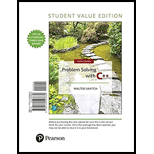Solutions for Problem Solving with C++, Student Value Edition Plus MyLab Programming with Pearson eText - Access Card Package (10th Edition)
Problem 2STE:
What would be the data for a program to add two numbers?Problem 4STE:
What is the difference between a machine-language program and a high-level language program?Problem 5STE:
What is the role of a compiler?Problem 6STE:
What is a source program? What is an object program?Problem 7STE:
What is an operating system?Problem 8STE:
What purpose does the operating system serve?Browse All Chapters of This Textbook
Chapter 1 - Introduction To Computers And C++ ProgrammingChapter 1.1 - Computer SystemsChapter 1.2 - Programming And Problem-solvingChapter 1.3 - Introduction To C++Chapter 1.4 - Testing And DebuggingChapter 2 - C++ BasicsChapter 2.1 - Variables And AssignmentsChapter 2.2 - Input And OutputChapter 2.3 - Data Types And ExpressionsChapter 2.4 - Simple Flow Of Control
Chapter 2.5 - Program StyleChapter 3 - More Flow Of ControlChapter 3.1 - Using Boolean ExpressionsChapter 3.2 - Multiway BranchesChapter 3.3 - More About C++ Loop StatementsChapter 3.4 - Designing LoopsChapter 4 - Procedural Abstraction And Functions That Return A ValueChapter 4.2 - Predefined FunctionsChapter 4.3 - Programmer-defined FunctionsChapter 4.4 - Procedural AbstractionChapter 4.5 - Scope And Local VariablesChapter 4.6 - Overloading Function NamesChapter 5 - Functions For All SubtasksChapter 5.1 - Void FunctionsChapter 5.2 - Call-by-reference ParametersChapter 5.3 - Using Procedural AbstractionChapter 5.4 - Testing And Debugging FunctionsChapter 5.5 - General Debugging TechniquesChapter 6 - I/o Streams As An Introduction To Objects And ClassesChapter 6.1 - Streams And Basic File I/oChapter 6.2 - Tools For Stream I/oChapter 6.3 - Character I/oChapter 7 - ArraysChapter 7.1 - Introduction To ArraysChapter 7.2 - Arrays In FunctionsChapter 7.3 - Programming With ArraysChapter 7.4 - Multidimensional ArraysChapter 8 - Strings And VectorsChapter 8.1 - An Array Type For StringsChapter 8.2 - The Standard String ClassChapter 8.3 - VectorsChapter 9 - Pointers And Dynamic ArraysChapter 9.1 - PointersChapter 9.2 - Dynamic ArraysChapter 10 - Defining ClassesChapter 10.1 - StructuresChapter 10.2 - ClassesChapter 10.3 - Abstract Data TypesChapter 10.4 - Introduction To InheritanceChapter 11 - Friends, Overloaded Operators, And Arrays In ClassesChapter 11.1 - Friend FunctionsChapter 11.2 - Overloading OperatorsChapter 11.3 - Arrays And ClassesChapter 11.4 - Classes And Dynamic ArraysChapter 12 - Separate Compilation And NamespacesChapter 12.1 - Separate CompilationChapter 12.2 - NamespacesChapter 13 - Pointers And Linked ListsChapter 13.1 - Nodes And Linked ListsChapter 13.2 - Stacks And QueuesChapter 14 - RecursionChapter 14.1 - Recursive Functions For TasksChapter 14.2 - Recursive Functions For ValuesChapter 14.3 - Thinking RecursivelyChapter 15 - InheritanceChapter 15.1 - Inheritance BasicsChapter 15.2 - InheritancedetailsChapter 15.3 - PolymorphismChapter 16 - Exception HandlingChapter 16.1 - Exception-handling BasicsChapter 16.2 - Programming Techniques For Exception HandlingChapter 17 - TemplatesChapter 17.1 - Templates For Algorithm AbstractionChapter 17.2 - Templates For Data AbstractionChapter 18 - Standard Template LibraryChapter 18.1 - IteratorsChapter 18.2 - ContainersChapter 18.3 - Generic Algorithms
Book Details
Now in its 10th Edition, Problem Solving with C++ is written for the beginning programmer. The text cultivates strong problem-solving skills and programming techniques as it introduces students to the C++ programming language. Author Walt Savitch’s approach to programming emphasizes active reading through the use of well-placed examples and self-tests, while flexible coverage means instructors can easily adapt the order of chapters and sections to their courses without sacrificing continuity. Savitch’s clear, concise style is a hallmark feature of the text, receiving praise from students and instructors alike, and is supported by a suite of tried-and-true pedagogical tools. The 10th Edition includes ten new Programming Projects, along with new discussions and revisions.
Sample Solutions for this Textbook
We offer sample solutions for Problem Solving with C++, Student Value Edition Plus MyLab Programming with Pearson eText - Access Card Package (10th Edition) homework problems. See examples below:
Chapter 1, Problem 1PChapter 2, Problem 1PChapter 3, Problem 1PChapter 4, Problem 1PChapter 5, Problem 1PChapter 6, Problem 1PChapter 7, Problem 1PChapter 8, Problem 1P//Include required header files #include<iostream> using namespace std; //Declaration of...
Chapter 10, Problem 1PChapter 11, Problem 1PChapter 12, Problem 1PChapter 13, Problem 1PRecursive function for nth Fibonacci numbers: The recursive function for nth Fibonacci number is...Chapter 15, Problem 1P// Include required library files #include <iostream> using namespace std; // Definition of...Chapter 17, Problem 1PProgram: //Header file #include <iostream> #include <deque> #include <algorithm>...
More Editions of This Book
Corresponding editions of this textbook are also available below:
PROBLEM SOLVING WITH C++-W/CD
6th Edition
ISBN: 9780321412690
Problem Solving With C++: The Object Of Programming
3rd Edition
ISBN: 9780201729993
Student Value Edition for Problem Solving with C++
8th Edition
ISBN: 9780132773348
Problem Solving With C++ Plus Myprogramminglab With Pearson Etext -- Access Card Package (8th Edition)
8th Edition
ISBN: 9780132774185
Problem Solving With C++
8th Edition
ISBN: 9780132162739
Problem Solving with C++ plus MyProgrammingLab with Pearson eText-- Access Card Package (9th Edition)
9th Edition
ISBN: 9780133862218
Problem Solving With C++ (Looseleaf) - With Access
9th Edition
ISBN: 9780133835267
EBK PROBLEM SOLVING WITH C++
9th Edition
ISBN: 9780133834505
Problem Solving With C++ , 9th Edition
9th Edition
ISBN: 9789352863082
Problem Solving With C++
9th Edition
ISBN: 9780133859614
Problem Solving with C++, Student Value Edition plus MyProgrammingLab with Pearson eText -- Access Card Package (9th Edition)
9th Edition
ISBN: 9780133862225
Problem Solving with C++ (9th Edition)
9th Edition
ISBN: 9780133591743
Problem Solving with C++ Plus MyLab Programming with Pearson eText -- Access Card Package (10th Edition)
10th Edition
ISBN: 9780134710747
Problem Solving with C++ - MyProgrammingLab
10th Edition
ISBN: 9780134522418
Problem Solving with C++ (10th Edition)
10th Edition
ISBN: 9780134448282
Problem Solving with C++, Student Value Edition
10th Edition
ISBN: 9780134543680
Problem Solving with C++ (10th Edition)
10th Edition
ISBN: 9780134521176
Related Computer Science Textbooks with Solutions
Still sussing out bartleby
Check out a sample textbook solution.
